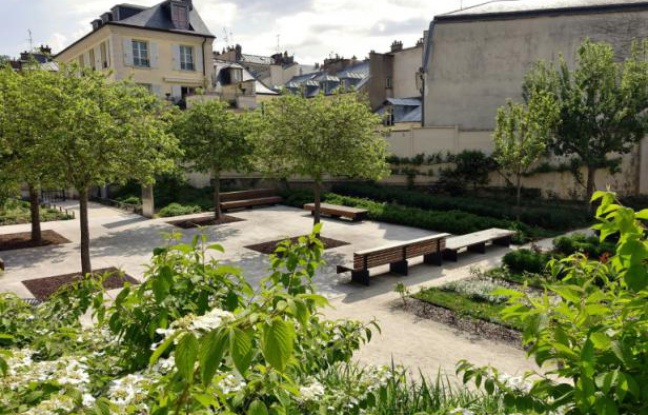Pesticides: Without Waiting for 2017, Municipalities have their Green Revolution

Maintain the gardens and public parks without using …
Maintain the gardens and public parks without using pesticides? Hundreds of towns have already done but in nine months, the law will impose this green revolution to all local authorities, despite the reluctance of many elected officials.
“We often come up against the argument: this is not possible,” says Stephen Kerckhove of the NGO Action for the Environment, co-organizer of a round table this week in the National Assembly with elected with adopted a pesticide-free policy.”Some did, others to learn from their experiences,” he says.
On 1 January 2017, in accordance with the law Labbé (2014), supplemented by Law on Energy Transition (2015), pesticides (herbicides, fungicides, insecticides) will be banned for road maintenance and public green spaces ( parks, gardens, squares, ornate beds, etc.), except for athletic fields and cemeteries.
“There is real momentum, but must be accelerated, and the Mayors already involved in the process have a role to play,” says Joel Labbé, Senator EELV.
The law does not provide sanctions for poor performers, but citizens can call their elected representatives and associations sue recalcitrant common, says Stephen Kerckhove.
Non-agricultural uses (communities and individuals) represent about 10% of pesticides used each year in France, according to Future Generations.
At the round table in the Assembly, the NGO said it had identified more than 440 municipalities “pesticide zero” in France out of a total of 36,000. “This figure is based on a voluntary declaration of Commons on our site, a priori there is so much more,” says Sophie Bordères future generations.
In Ile-de-France, Natureparif are more than 150 municipalities without pesticides, even in cemeteries and stadiums, and hundreds of others engaged in a policy of reducing the use of these products. Versailles for example, was a pioneering city in this area, especially in the cemetery, a place where the sight of any weed is poorly tolerated by the people.
– Vision of the nature in the city –
During the roundtable, representatives of Mouans-Sartoux (Alpes-Maritimes), Barjac (Gard), Miramas (Bouches-du-Rhône), Lardy (Essonne) Bouvron (Loire-Atlantique) and Langouet (Ile-et -Vilaine) described how their town has turned its back to the agrochemical industry.
“Stop pest is a new constraint for employees, we must convince explaining why and how we’ll do it,” says Cédric Cazal Miramas. “We have highlighted the health risks incurred by agents” who use these products regularly, says the technician, and “we also relied on a study that showed that almost all the rivers in our area was polluted “pesticide residues.
A Langouet the transition “has been difficult because the staff just being formed at a proper use of pesticides,” recalls wryly Daniel Cueff. It took “unlearn”.
To avoid pesticides, the options list is long: mechanical weeding (hoes, chisels, steel or nylon brushes, etc.), thermal weed control (hot water, steam, gas), mulches to prevent regrowth (dead leaves, wood chips, grass clippings, etc.), covering plants, grazing animals, etc.
At Lardy, “we have defined semi-natural areas (only one mowing per year), conventional (six clippings) and ornamental which require more care,” says Gérard Bouvet. “Then we tested various alternative” to chemical weeding, “it took a little time,” admitted Deputy Mayor stressing that “does not necessarily toggle from one year to the other to zero pesticide “.
Beyond the techniques work, elected officials are unanimous in stressing the big communications effort to make towards their citizens.
“Learning to enjoy flowering meadows instead of lawns,” “tolerate some grass on sidewalks or under trees”, “raise the seasons and local plants”: these perceptions do not self-evident summarizes Stephen Kerckhove. “This is a new vision of nature in the city” to be installed.
Enjoyed this? Get the week’s top France stories
One email every Sunday. Unsubscribe anytime.


